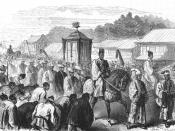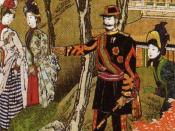Emperor Mutsuhito, reigning from 1867 to 1912, called his reign the Meiji or ÃÂEnlightened Rule.ÃÂ Japan, during this era, began to develop as an international industrial and military power. The Meiji Restoration, in which the emperor gained the throne, is also when the shogun, whom had ruled Japan for hundreds of years, were forced out of power by the samurai and nobles. The Japanese had been a farming or agrarian society ruled by a small group of nobles and enforced by warriors known as the samurai. In order to stay in power, they banned outside influence and trade within their society. The Meiji Restoration transformed JapanÃÂs economic, political and social structure in ways that were similar to what had occurred in the western industrial revolutions.
In the United States development, it was our subservience to Great Britain that caused our government to revolt against the political and economic control of Great Britain.
The American revolution allowed the United states to take the first step toward independence and as a self supporting nation. The Civil war was partially caused by the Northern states desire to change from a farming or agrarian land to an industrial society. During the period of conflict, the North developed its factories to produce armaments and manufactured goods. Following the Civil war, the United States began to expand and take over other territories which were formally owned by France and Spain. These areas provided us with sources of raw material for our growing industrial demands and a market place for our finished products.
In the development of Great Britain, parliament broke down the old feudal system and became the central authority located in London. Gradually, Britain became a stronger military and industrial power and colonized major sections of the world. These colonies included America, India, and parts of Africa. From these foreign territories, they were able to provide themselves with raw materials, inexpensive labor and markets.
In Europe, Germany followed a similar path. There was a period of consolidation in which diverse groups, tribes and states were bonded together into the German confederation. Along with this consolidation of power, the start of industrialization, education and nationalism, Germany became a colonial power expanding its influence into adjoining lands and colonies in parts of Africa. By the early 1900ÃÂs, Germany was starting to attempt the complete domination of Europe. This resulted in World War I.
In the early days of the Meiji restoration, emperor Mutsuhito brought in foreign advisors and set up strong educational institutions to study the western nation in order to follow their pattern of development. He was able to have a strong imperial rule with most of the power in the executive branches and he centralized the governments center, moving it to Edo, which we now know as Tokyo. He reestablished the land ownership and encouraged the development of industrialization. Simultaneous with the political and economic changes, Japan developed a new and powerful military force. The Government worked closely with industrial leaders to equip their army with modern weapons. They developed a strong educational system inspired by the western model. They continued a tradition of loyalty to the family, the community, and the emperor.
By the early 1900ÃÂs, Japan utilized its new social structure and strong military power to start building a new empire. They expanded their influence into Korea, Russia and China. The success of the Meiji revolution and restoration made Japan a powerful industrialized colonial empire and world power. The other world powers of Britain, the United States and Germany made it inevitable that there would be a tremendous collision. The collision between these mighty forces was the cause of World War II.
*This essay was written about a year ago, and all of the information was either from class notes or my class text book, which I forget the name of.





